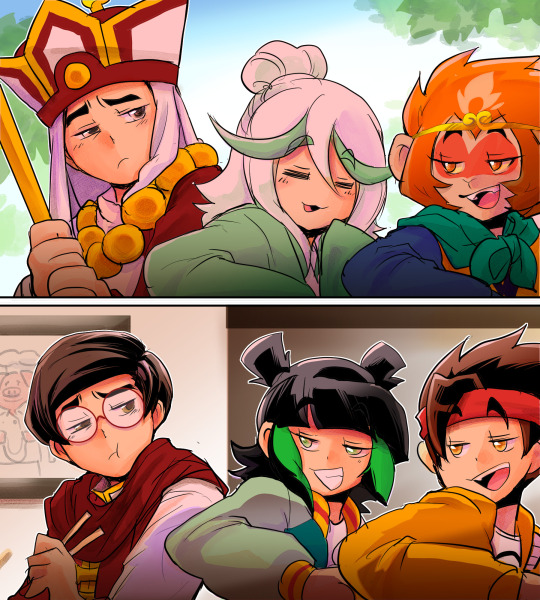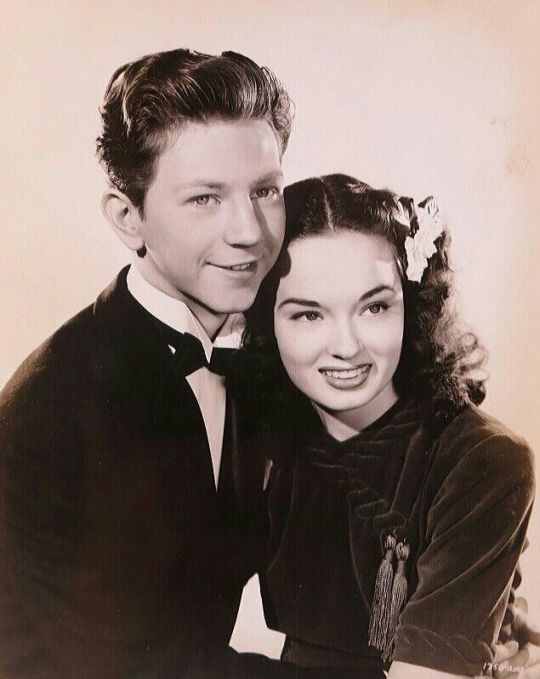#de tal palo tal astilla
Text
Hitting Roxy and Dave with the "Not feeling human anymore because their now gods" beam in my Earth C Au
Roxy trying her hardest to ignored it while Dave disappears from the city to try to ignored it they're really are family
13 notes
·
View notes
Text
Blue eyed Somyung can't hurt you, she isn't real.
Blue eyed Somyung:

Look at this freaky, scarry blue eyes. HELP.

She is slowing becoming like her mother, damn. Wait, what's the comic name again?
3 notes
·
View notes
Note
Los niños son el reflejo de los padres, de padres terroristas, hijos terroristas
Efectivamente
Nuestros padres son el espejo en el que nos reflejamos
Si por la guerra estos niños quedan huérfanos, la gran mayoría serán rechazados por la simple crueldad terrorista de sus padres
Como siempre sucede, serán remitidos a Europa en donde se les intentará buscar un hogar y cada vez es más difícil que alguien acoja a "niños de la guerra", por miedo a que no logren desquitarse de ese odio inculcado o vivido.
Gracias por tu colaboración 🙏
2 notes
·
View notes
Text

5 notes
·
View notes
Text
📍 ) casa de las risas.
@jvvnsoo ha exclamado ' ¡cuidado con el espejo! '

aviso llega demasiado tarde, razón por la cual zion tiene apoyada una mano contra su frente y los ojos cerrados, contando mentalmente hasta diez— o cuantos números sean necesarios para no romper allí mismo ese espejo. su poca paciencia se ha visto muy afectada en el último tiempo. ' hm, mierda ' masculla, apoyándose contra otro espejo que tiene a sus espaldas. ' ¿puedes...— ¿me dices si ha quedado una marca o algo? '
3 notes
·
View notes
Text
Fills de Déu/Children of God/Hijos de Dios
Fills de Déu/Children of God/Hijos de Dios
Fills de Déu
Diuen que de tal fusta tal estella.
♥Feu-vos de tan primera classe que el vostre estatus es faci més elevat que el Meu.
Si som fills de Déu com a ànimes.., com és que no tenim la mateixa manera de pensar que Ell?
A casa d’algú, també els fills, de vegades son tot el contrari als pares, oi? Però, en el fons, només és un acte de rebel·lió per part del tràngol de l’adolescència.…

View On WordPress
#caràcter#carácter#character#children of God#de tal palo tal astilla#fills de Déu#força de l&039;ànima#from such wood such chips#fuerza del alma#hijos de Dios#pensar com Déu#pensar como Dios#ser de primera clase#ser de primera classe#strength to the soul#tal fusta tal estella#thinking like God#to be first class
0 notes
Text
Umm di-did we survive?
That two are together or they're just like friends?I didn't notice anything romantic but Idk if it's just me or Idk how to put romantic actions in a way
Also spoilers ahead:
NIGHT SWAN IS HUMAN?!!?
#just dance 2024#just dance#jd night swan#jd the traveler#Anyways de tal palo tal astilla con Traveler y Wanderlust#the two of them bringing humans to the danceverse
17 notes
·
View notes
Text
vegetta le pego lo de la simetría a roier <3
6 notes
·
View notes
Text
PLANETA LITERARIO: DE TAL PALO TAL ASTILLA -Relato de las travesuras de Juventud por Senén González Vélez
PLANETA LITERARIO: DE TAL PALO TAL ASTILLA -Relato de las travesuras de Juventud por Senén González Vélez
LITERARY PLANET: LIKE JUST LIKE ASTILLA -Story of the pranks of Youth by Senén González Vélez
Senén González Vélez Escritor COLOMBIA
Relato de las travesuras de juventud….
Tale of the pranks of youth….
Rigoberta josefina Penagos, la conocí hace muchísimos años, tiempos en que aparecía de vez en cuando, por las esquinas de la Universidad de Cartagena. Yo apenas era un estudiante de derecho, de…

View On WordPress
#"DE TAL PALO TAL ASTILLA"#COLOMBIA#CUENTO#escritor#LITERAL PLANET#lomasleido#lomasvisto#PLANETA LITERARIO#RELATO#RELATOS DE JUVENTUD#RIGOBERTA#SENEN GONZALEZ VELEZ MEJOR EDITORIALISTA DE LA DECADA
0 notes
Note
Gabi being the type to ask Miguel for help on her project…at the last minute 😭 and they only have an hour left to go to the store and get the supplies that she needs. Probably pulling a little all nighter, waking up in the morning to find them both asleep on the floor with a throw blanket over them ☹️ ((and of course the finished project laying on the table))
This bring me so much memories 🤣🤣
------------
"Papa?" Gabi's meek voice made his attention to be on her. Her hands fiddled anxiously as she stepped closer.
"What's wrong?"
"Could... you help me?"
"Hm?" He typed some more data in his report as he waited for Gabi's response.
"I need a little diorama for my class. Something about the solar system."
"Sure do, We'll organize eachother tomorrow so we can.-"
"It's for tomorrow morning" She mumbled and Miguel looked at her, gravely.
"Why didn't you tell me sooner?" He looked at his watch and sighed. One hour left before it closed.
"Perdón, papito. Es que se me olvidó. A la próxima no se me olvida. Lo prometo!" (I'm sorry, Papa. I forgot. won't happen next time. Promise!)
"Get your sweater. We have less than an hour before the shop closes." He rubbed his face and took the car keys.
"You going out?" You poked your head from his office's door as you were rocking Benjamin to sleep.
"Gabi forgot something."
"Ooh! Yeah, I forgot to mention that she needed help with a project, sorry!"
De tal palo, tal astilla. (Like mother, like daughter)
He sighed and drove to the store.
-----
The clerk stared at him all too knowingly, as if saying "Yeah, you and other parents too."
He charged him, materials and a little cookie pack Gabriela put in last minute with a cheeky glance.
--------
"Pásame el pegamento." He'd mumble as he held Jupiter's rings around it. Gabi helped him to then smear the glitter on the black cardboard.
(Pass the glue)
"Papa, open up." She fed Miguel with a small cookie as he worked. She cut up some star shapes, as Miguel painted the planets. He was no artist by any means, but it would be enough to go by.
Even though he grumbled, he and Gabriela would make sure to finish it on time. More like, he would finish it.
Gabriela had been asleep after an hour, leaving him to deal with it. She curled up in the couch as he was sitting on the floor legs crossed, hunched over as his hands maneuvered the tiny scissor Gabi had donned him with while trying to cut the shape of a moon.
-----
He awoke with a blanket on, his head under a pillow, comfortably.
Great job, Papa.
A note scribbled besides the project.
His muscles ached, but seeing Gabi's face lit up in surprise and hug him in excitement at what he had created made it less painful. His all nighter had been worthed it.
#miguel o'hara#miguel o'hara x reader#atsv miguel#dad miguel o'hara#gabi o'hara#t writes✨#Soccer Family ⚽🕷️
1K notes
·
View notes
Note
si tuvieras que decidir entre yusaku y toichi, quien Crees que le heredo los peores genes a sus hijos? [hc de TAL Palo tal astilla]
Los genes y sus personalidades no son tanto el problema, ya que tanto Shinichi como Kaito hacen lo que pueden con lo que tienen, pero Kaito lo tiene peor ya que le heredo hasta los enemigos a su viejo.
En cambio Shinichi se metio en sus problemas solito.(? (Al menos que me salgan con que la organización ya le tenia echado el ojo a Shinichi y que sus viejos forman parte de ella, idk)
Pero creo que Kaito lo tiene un poco peor en general porque Toichi me parece peor hahahaha
20 notes
·
View notes
Note
Hello:
This is a nuance question. What are the minor differences between tan, tanto, cuán, and lo (adjetivo)poder ser a (sustantivo) when modifying "to an extent" something is?
There's a pattern to these words that can help
Typically the question words have a QU or C sound; and the descriptors here have the T
The question words can sometimes be used as other parts of speech, but the questions or implied unknowns will have accent marks
This will make more sense below
-
First, tal and cual - used to describe nouns, or sometimes become nouns themselves:
tal = such, such as / "one such" [noun]
tales = such, such as / "some such" [plural noun]
cuál = which? / which one
cuáles = which (ones)? / which ones? [plural]
(el/la) cual = the one (in particular), the one that/which, one such
cual = as [in poetry; synonymous with como, very unusual]
If you're seeing tal and cual you're seeing nouns for the most part; tal is "such" or "like that" and cuál is more common with the accent mark or in a relative clause
De tal manera... = In that way... / In such a way...
De tal palo, tal astilla. = "Chip off the old block" / "The apple doesn't fall far from the tree"
[lit. "from such a (wooden) stick, such a splinter"]
Escribe sobre la vida tal y cómo es. = "He/She writes about life exactly how it is."
[tal y cómo is literally "such and how" but often means "exactly so/as"]
Tal leyenda no me interesa. = A legend like that doesn't interest me. / Such a legend doesn't interest me.
There's also an expression Fulanito/a de Tal which is very idiomatic but it's a made up placeholder name like "Mr/Mrs Whoever from Wherever"... fulano/a is basically "someone you don't know their actual name", and de Tal is "from Such" so it comes out as "What's-their-name from Wherever"
...You see this in contexts where someone knows nothing about the person, or they mean so little to them that they can't be bothered to learn their name
You will also see this expression:
(son) tal para cual = "they were made for each other" / "a match made in heaven"
You say this about people who are very much alike
...
Now as for cual you get into questioning words; an unknown noun but specific
If tal is "such", cuál with the accent mark is qué + tal meaning "what such"... aka "which one"
¿Cuál es? = Which one is it?
¿Cuáles son? = Which one are they?
Seeing cual without the accent mark is most commonly used in what they call relative clauses - it's a clause within a sentence that gives more specific information "related" to what noun you just brought up:
Esa torre es la Torre Eiffel, la cual es el edificio más conocido de Francia. = That tower is the Eiffel Tower, which is the most well-known building in France.
El amor, el cual es un tema muy importante para muchísimos autores y poetas, sigue siendo expresado y discutido en el arte de todas formas. = Love, which is a very important theme for MANY authors and poets, continues to be expressed and discussed/debated in art of all kinds.
Relative clause just means you decide to add a comma and talk about a specific noun (which could be a person, place, or thing) almost in an aside
You can also do relative clauses with el que and la que they're just more informal than el/la cual ...it's like saying "the one that" vs "the one which"
....
Also I should say cual can also be used as como in some poetry. It's really uncommon today but every so often in poetry you'll see it.
Like rojos labios cual carmín is the way they translated "lips that shame the red red rose" but it literally means "(VERY) red lips like carmine/vermillion" - it reads like very flowery writing, usually reserved for older things or fairy tales or something that feels antiquated
-
Next we move on to tan/cuán and tanto and cuánto/a and again there's a pattern
tan/cuán work with adjectives and adverbs as "so much" and "how much"
And tanto/a and cuánto/a work with nouns as "so many" and "how much/many?"
...
But actually first let me say you will NEVER have to use cuán for "how much + adjective/adverb"; it is considered very archaic and only appears in lyrics and poetry. The only time I've ever seen it was in the translation for Pocahontas in Colors of the Wind:
¿Cuán alto el árbol crecerá? = "How high does the sycamore grow?"
[lit. "how high will the tree grow?"]
But from that you can say it's "how much" in terms of "to what extent" - if you're using adjectives you use them agreeing with the gender/plurality
More to the point though, what you actually use depends on region and thankfully it's pretty evenly between Spain and Latin America, and reasonably understandable what you're saying/hearing regardless so no one's really confused it's just a difference in region:
Latin America will use qué tan (which is a deconstructed cuán), and Spain prefers cómo de which is more like "to what extent"
¿Qué tan alto es el árbol? = How tall is the tree?
¿Qué tan alta es la montaña? = How high is the mountain?
¿Cómo de alto es el árbol? = How tall is the tree?
¿Cómo de alta es la montaña? = How high is the mountain?
¿Qué tan lejos? = How far (away)? [adv]
¿Cómo de lejos? = How far (away)? [adv]
And again adverbs won't need to agree; ¿qué tan rápido/a? is "how fast" for example as an adjective, but ¿qué tan rápido? by itself could be "how quickly?"; same with cómo de - only difference is that's for Spain
And cuánto is used for amounts, "how much/many?"
¿Cuánto cuesta? = How much does it cost?
¿Cuánta comida hay? = How much food is there?
¿Cuántos hombres? = How many men?
¿Cuántas mujeres? = How many women?
No sabes cuánto te quiero. = You don't know how much I love you.
[cuánto here as a noun is like "the (unknown) amount"]
PS en cuanto + subjunctive is "as soon as + subjunctive"; don't worry about it for right now, but every so often you see a cuanto with no accent mark
...
So on to tan and tanto/a, same general distinction
tan is "so/quite/very" used with adjectives and adverbs, and tanto/a is often done with nouns and countable things
Eres tan listo. = You're so smart.
Eres tan lista. = You're so smart.
Son tan listos. = They're so smart.
Son tan listas. = They're so smart.
Hay tanta ropa. = There's so much clothing. / There's so many clothes.
Hay tanto peligro. = There's so much danger.
Tenemos tantos problemas. = We have so many problems.
Tenemos tantas personas. = We have so many people.
It's really the same difference between mucho/a and muy
With comparisons, you use tan or tanto with como. The important thing here is that these are expressions of equality or equivalence, rather than "more/better" or "less/worse" that you'd see with más/mejor and menos/peor.
Es tan listo como ella. = He's as smart as she is.
Es tan lista como él. = She's as smart as he is.
Son tan listos como ellas. = They're as smart as they [f+f] are.
Son tan listas como ellos. = They're as smart as they are.
Sus libros no son tan famosos como sus poemas. = Their books aren't as famous as their poems.
Sus películas no son tan famosas como sus obras de teatro. = Their movies aren't as famous as their theatrical works.
tanto como is more used as "(someone) as well as (someone else)" or "(something) as much as (something else)"... usually in the context of something pertaining to or affecting something/someone, or just overall "involvement"
Tanto yo como mis colegas... = Myself as well as my colleagues...
Tanto tú como tus amigos... = (Both) You as well as your friends...
And you use it to compare equal amounts of things with others:
Tienen tanto dinero como yo. = They have as much money as I do.
Tienen tanta influencia como nosotros. = They have as much influence as we do.
Tengo tantos amigos como amigas. = I have as many (male) friends as (female) friends.
Tengo tantas amigas como amigos. = I have as many (female) friends as (male) friends.
You can also see tanto as an amount like "as much" or "so much" just a plain noun, or an adverb like saying no tanto "not so much" or "not really"
And then there's mientras tanto which is "meanwhile" [lit. "while as/so much"]
-
And I'm not entirely sure what you mean by lo in context with comparisons so I'd probably need more context
I'm used to seeing things like lo más antes posible "as soon as possible" or "the soonest possible", or lo más imporante "the most important thing"
Also lo máximo/mínimo que as like "the most/least that (+ something else)"
#spanish lessons#langblr#learning spanish#spanish grammar#language#languages#asks#la gramatica#long post
48 notes
·
View notes
Text
Like father like son / De tal palo, tal astilla😸



#boku no hero academia#izuku midoriya#my hero academia#dfo#dad for one#all for one is hisashi midoriya#all for one#all for one is izuku's father
100 notes
·
View notes
Text
Papá rei y miri/ de tal palo tal astilla



51 notes
·
View notes
Text

Donald O´Connor-Ann Blyth "De tal palo, tal astilla" (Chip off the old block) 1944, de Charles Lamont.
19 notes
·
View notes
Text

De tal palo tal astilla
✨𝕮𝖗𝖉. 𝕬𝖗𝖙.:https://x.com/koburashiwa?t=rDvdj6X7kGiQjd_PlsRTBg&s=09
Sígueme en Facebook
7 notes
·
View notes